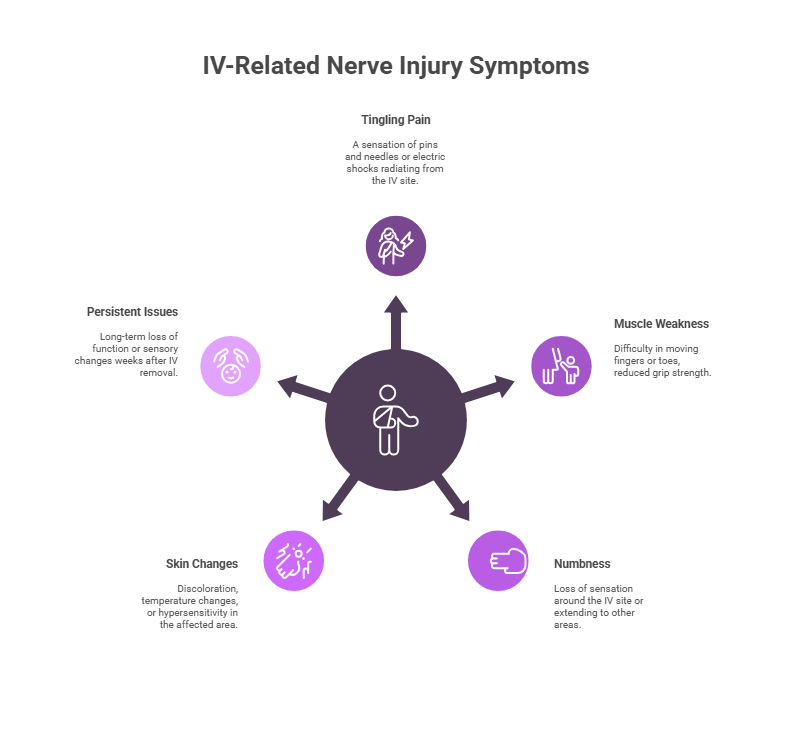
Yes, if the nerve damage was caused by medical negligence, such as improper insertion, failure to monitor, or ignoring clear symptoms, you may be able to sue for compensation. Nerve injuries from IVs are often preventable and can qualify as medical malpractice when healthcare providers fail to follow proper protocols.
Nerve damage from an IV can lead to chronic pain, loss of function, and permanent disability. This damage can drastically impact your quality of life, preventing you from working or performing daily activities.
Without proper legal action, you could be left with mounting medical bills and no way to cover them.
Our Baltimore IV infiltration lawyer can help determine if you have a case and fight for the compensation you deserve.
Proving your IV nerve damage case
To successfully pursue a medical malpractice claim for IV-related nerve damage in Maryland, we must prove four key elements on your behalf:
1. Duty of care
Healthcare providers owe patients a duty to provide care that meets established medical standards. When you receive IV treatment, medical professionals must follow proper protocols for insertion, monitoring, and removal.
2. Breach of that duty
You must prove the healthcare provider failed to meet the standard of care. This could include improper IV placement near a nerve, failure to respond to complaints of pain, or not following established guidelines for IV management.
3. Causation
The nerve injury must be directly tied to the provider’s actions or failure to act. Medical records, expert testimony, and documentation of your symptoms immediately following the IV procedure will help establish this connection.
4. Damages
You must demonstrate that you suffered economic or non-economic losses as a result of the nerve damage. This can include medical bills, lost wages, pain and suffering, and diminished quality of life.
⚠️ Maryland’s laws require expert certification before filing with the Maryland Health Care Alternative Dispute Resolution Office; our legal guidance is essential to this complex process and ensures your claim meets all legal requirements.
Additional reading: hospital left iv in arm lawsuit

When does nerve damage from an IV become malpractice?
Not every unfortunate outcome qualifies as medical malpractice. However, nerve damage from an IV may constitute malpractice when healthcare providers fail to adhere to the standard of care expected in the medical community.
The standard of care for IV placement includes properly identifying appropriate veins, using correct insertion techniques, and avoiding areas near major nerves when possible. When healthcare providers deviate from these standards and cause harm, it may be considered negligence.
Malpractice occurs when a provider’s failure leads to preventable harm. For example, ignoring patient complaints of unusual pain, burning, or numbness at the IV site could constitute negligence if these symptoms indicated nerve damage that could have been prevented with prompt intervention.
💡 Hypothetical Scenario: A patient repeatedly tells a nurse about severe burning pain radiating down their arm during an IV infusion, but the nurse dismisses these complaints as normal discomfort. Hours later, when the IV is finally removed, the patient has developed permanent nerve damage in their hand and forearm, resulting in chronic pain and reduced function.
This type of situation may give rise to a ‘hospital left IV in arm lawsuit’ when staff fail to respond to clear warning signs and leave the IV in place far too long.
Additional reading: Maryland cap on non-economic damages
Factors that might lead to a successful lawsuit
When evaluating whether you have a strong case for an IV nerve damage lawsuit in Maryland, several factors can strengthen your claim:
- The injury caused long-term or permanent nerve damage rather than temporary symptoms
- Medical providers failed to follow proper IV protocol, such as checking for blood return or using appropriate insertion techniques
- You reported symptoms of nerve damage (burning, electric pain, numbness) that were ignored or dismissed
- Imaging or diagnostic tests confirmed nerve damage consistent with IV complications
- You required additional surgeries, treatments, or therapies to address the nerve damage
- The medical facility has a history of similar incidents or inadequate training procedures
- Your medical records document the timeline of events and support your claim
💡 Clear medical documentation and early reporting of symptoms significantly strengthen these claims, as they establish a direct link between the IV procedure and your injury.
Think you may have a case? Contact our firm to speak with Frank Spector directly.
What can you sue for in an IV nerve injury case?
If you’ve suffered nerve damage from an IV in Maryland, our lawyers may be able to help you recover both economic and non-economic damages under Maryland medical malpractice laws, including §3-2A-09 of the Courts and Judicial Proceedings Article.
💡 Economic damages compensate for your financial losses, such as medical costs and lost wages. Non-economic damages cover the physical pain, emotional suffering, and loss of enjoyment that come with nerve injuries.
Here are the main categories we pursue on your behalf:
- Medical expenses: We seek full compensation for all past and future medical costs, including hospital visits, specialist care, diagnostic testing, pain management, and physical therapy. Nerve injuries often involve complex, ongoing treatment.
- Future medical needs: If you’ll require long-term care, such as additional surgeries or continued rehabilitation, we make sure your claim reflects those anticipated expenses.
- Lost income and reduced earning potential: If your injury caused you to miss work or limited your ability to perform your job, we’ll seek compensation for both past lost wages and future loss of earning capacity. This is especially important if the injury permanently affects your career.
- Pain and suffering: Maryland law allows compensation for the physical pain and emotional distress caused by nerve damage. These non-economic damages can be significant, but they are subject to statutory caps. As of 2025, the cap for non-economic damages in medical malpractice cases is $905,000, increasing annually by $15,000.
- Loss of enjoyment of life: Nerve damage can rob you of the ability to enjoy hobbies, activities, or even basic daily functions. We factor in how your injury has changed your lifestyle, relationships, and independence.
Some Maryland IV injury cases involving permanent damage have resulted in six- and even seven-figure settlements. When we evaluate your claim, we carefully review the medical records, expert reports, and long-term impact of the injury to pursue the full compensation you may be entitled to, especially in cases involving lasting disability or major changes to your quality of life.

How much could you sue for in a nerve damage from an IV case?
In Maryland, the average settlement for nerve damage cases varies widely depending on the severity of the injury and its impact on your life. For IV-related nerve injuries, settlements typically range from $50,000 for minor injuries to over $500,000 for severe, permanent damage.
We will work diligently to secure compensation that truly reflects the full extent of your suffering and losses, rather than settling for the average amount.
At Frank Spector Law, we have a strong track record of obtaining favorable outcomes across a wide range of serious medical malpractice cases, including those involving preventable injuries caused by hospitals, nurses, and other healthcare providers.
- $5,000,000: Awarded for a surgical injury case in Baltimore, demonstrating our firm’s ability to secure substantial compensation in serious medical malpractice matters.
- $2,100,000: Secured for a family following a hospital medication error in Anne Arundel County that resulted in death, showing our commitment to holding healthcare facilities accountable.
- $1,000,000: Awarded in a surgical error case in Western Maryland, highlighting our success in obtaining maximum policy limits for clients injured by medical negligence.
✔️ While each case is different, these outcomes show our experience in complex medical claims and our commitment to building strong cases supported by expert evidence and deep legal strategy.
How our lawyers build IV nerve injury claims
At Frank Spector Law, we conduct thorough investigations into every aspect of your IV nerve injury case. Our approach involves analyzing nurse logs, insertion technique documentation, medication administration records, and patient complaints that may have been overlooked.
We collaborate with medical experts, including specialists from institutions like Johns Hopkins Hospital and the University of Maryland School of Medicine, who can establish where deviations from the standard of care occurred. These experts help identify exactly how the nerve damage happened and why it should have been prevented.
If you’ve suffered unexplained nerve pain after an IV, we’ll help uncover the cause and determine whether a claim exists. Don’t assume your symptoms are just an unfortunate complication—many nerve injuries result from preventable errors.
If you believe your nerve injury was caused by medical negligence, contact our firm for a free, confidential consultation.
What causes nerve damage from an IV?
Nerve damage from IV therapy can occur through several mechanisms. Understanding these causes helps establish negligence in medical malpractice claims:
- Improper IV insertion near or into nerve tissue: When a needle directly strikes or penetrates a nerve, it can cause immediate and sometimes permanent damage. Proper anatomical knowledge and technique are essential to avoid this complication.
- Failure to recognize signs of infiltration or extravasation: When IV fluids leak into surrounding tissues rather than the vein, they can create pressure and inflammation that damages nearby nerves. Healthcare providers must monitor for swelling, pain, and changes in skin temperature or color.
- Leaving an IV in too long without monitoring: Even properly placed IVs can become dislodged or cause problems over time. Guidelines require regular assessment of IV sites to prevent complications.
- Using irritant medications without proper safeguards: Certain medications can damage tissue and nerves if they leak outside the vein. Extra precautions should be taken with these high-risk substances.
- Reusing or improperly placing IV lines in overused limbs: Patients who require frequent IV therapy are at higher risk for complications if providers don’t rotate sites appropriately.
💡 Nerve damage is most likely when patient complaints (burning, numbness, tightness) are ignored. Immediate intervention when symptoms first appear can often prevent permanent injury. Studies show that early intervention is key—research published in the Journal of Hand Surgery found that early neurorrhaphy, or surgical repair, of acute nerve injuries leads to the best outcomes.
Symptoms of IV-related nerve injury
Recognizing the symptoms of nerve damage from an IV is important for both medical treatment and building your legal case. Be alert for these warning signs:
- Tingling, burning, or electric-like pain radiating from the IV site: These sensations often indicate nerve irritation or damage and require immediate attention. The pain may follow the path of the affected nerve through the arm or hand.
- Muscle weakness or inability to move fingers/toes normally: Nerve damage can impair muscle function, resulting in weakness, reduced grip strength, or even paralysis in the affected limb.
- Numbness or loss of sensation around the IV site or extending to other areas: Decreased sensation or complete numbness may indicate nerve injury. This can affect a small area or extend to larger portions of the limb.
- Skin discoloration, temperature changes, or sensitivity: The affected area may appear paler or redder than surrounding skin, feel unusually cold or hot, or become hypersensitive to touch.
- Long-term loss of function or persistent sensory changes: While some symptoms may improve with time, persistent problems weeks after IV removal suggest more serious nerve damage.
⚠️ These symptoms may appear immediately or worsen over time, and medical staff should act fast to prevent permanent damage. Documenting when these symptoms began concerning your IV therapy is vital for your medical malpractice claim.

Preventing nerve damage from IV treatment: what the professionals should have done
Healthcare providers have a responsibility to follow established protocols to prevent nerve damage during IV therapy. Understanding these protocols helps identify where negligence may have occurred in your case:
- Regular site checks by medical staff: Healthcare providers should assess IV sites at least hourly, looking for signs of infiltration, inflammation, or patient discomfort. Many facilities require documentation of these checks.
- Using ultrasound guidance for difficult insertions: For patients with challenging vascular access, ultrasound technology can help visualize veins and surrounding structures to avoid nerve injury. Failure to use available technology may constitute negligence.
- Not ignoring complaints of discomfort: Patient reports of unusual pain, burning, or other symptoms should trigger immediate assessment of the IV site. Dismissing these complaints can lead to preventable nerve damage.
- Avoiding certain insertion sites for high-risk patients: Some locations, such as the wrist or antecubital fossa (elbow crease), carry higher risks for nerve injury. Providers should consider patient factors when selecting IV sites.
- Replacing IVs at recommended intervals: Guidelines from the Maryland Department of Health and Centers for Disease Control typically recommend replacing peripheral IVs every 72-96 hours to prevent complications. Extended duration increases the risks of infiltration and nerve damage.
⚖️ Prevention failures can be used as evidence of negligence in a legal claim. When healthcare providers deviate from these established practices and harm results, they may be held liable for malpractice.
Hypothetical scenario for a nerve damage IV lawsuit
⚖️ The following case illustrates how IV infiltration injuries can lead to significant compensation in Maryland:
A 42-year-old accountant from Baltimore was admitted to the hospital with pneumonia. A nurse inserted an IV into her wrist to administer antibiotics, but she quickly began feeling burning and tingling in her hand and fingers.
The warning signs were ignored.
Despite her repeated complaints, staff assured her the discomfort was normal. For 12 hours, no one reassessed the IV site. When a new nurse arrived, she found swelling and redness, signs of infiltration. The IV was removed, but it was too late to prevent serious nerve damage.
The long-term impact was life-changing.
After discharge, the patient continued to experience numbness, weakness, and pain in her dominant hand. A neurologist diagnosed permanent radial nerve injury, which severely limited her ability to type and write, essential functions in her accounting job.
Expert testimony confirmed medical negligence.
With the help of a medical malpractice attorney, the patient filed a claim against the hospital. Her legal team presented expert testimony showing that nurses had failed to monitor the IV site and respond to known complications. Financial experts also documented her reduced earning capacity and quality-of-life losses.
Final settlement: $425,000.
The case was resolved before trial. The settlement covered ongoing treatment, past and future lost wages, and compensation for her pain and suffering. Without legal guidance, her injury may have been minimized or undervalued. Experienced representation helped ensure she received the compensation she deserved.
Talk to a Maryland IV malpractice lawyer today
Nerve injuries from IVs can lead to serious, permanent, and often avoidable complications that impact every aspect of your life. The pain, disability, and financial burden from these injuries shouldn’t be your responsibility when they result from medical negligence.
At Frank Spector Law, we understand the complexities of IV nerve damage cases and have the experience to hold healthcare providers accountable. With our 30 years of experience helping people in Maryland, we know how to build compelling cases that result in fair compensation.
Don’t wait to find out if you have a case. Maryland’s statute of limitations restricts the time you have to file a medical malpractice claim. The sooner you contact us, the sooner we can begin investigating your case and protecting your rights.
For a free consultation with Frank Spector personally, call us today at 443-845-1456 or use our contact form to discuss your IV nerve injury case.

FAQs about IV-related nerve damage lawsuits
What if I didn't feel symptoms right away?
Maryland's "discovery rule" may apply if your nerve damage symptoms developed or were diagnosed after leaving the hospital. This rule states that the statute of limitations begins when you discovered or reasonably should have discovered the injury. Documenting when symptoms first appeared and when you received a diagnosis is essential for these cases.
Can I sue a nurse or just the hospital?
You can potentially sue both the individual healthcare provider (nurse, physician, or technician) who caused the injury and the hospital or facility where it occurred. Hospitals are often liable for their employees' actions under the legal principle of "respondeat superior." Your attorney will help determine all potentially liable parties in your specific case.
What does it cost to bring a malpractice case?
At Frank Spector Law, we handle medical malpractice cases on a contingency fee basis, meaning you pay no upfront costs or attorney fees. We only collect a fee if we successfully recover compensation for you. This arrangement allows access to quality legal representation regardless of your financial situation.
Do I need expert witnesses for my claim?
Yes, Maryland law requires a "certificate of merit" from a qualified medical expert before filing a medical malpractice lawsuit. This certificate must state that your healthcare provider deviated from the standard of care and that this deviation caused your injury.
Our firm works with qualified medical experts, including specialists affiliated with respected institutions like the Maryland Circuit Court's approved expert witness registry, who can evaluate your case and provide the necessary certification.
